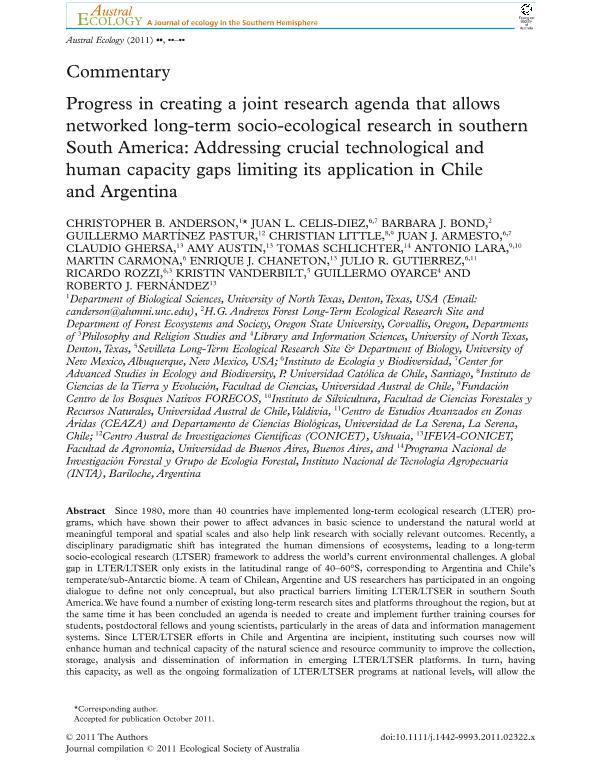Artículo
Progress in creating a joint research agenda that allows networked long-term socio-ecological research in southern South America: Addressing crucial technological and human capacity gaps limiting its application in Chile and Argentina
Anderson, Christopher Brian ; Celis Diez, Juan L.; Bond, Barbara J.; Martínez Pastur, Guillermo José
; Celis Diez, Juan L.; Bond, Barbara J.; Martínez Pastur, Guillermo José ; Little, Christian; Armesto, Juan J.; Ghersa, Claudio Marco
; Little, Christian; Armesto, Juan J.; Ghersa, Claudio Marco ; Austin, Amy Theresa
; Austin, Amy Theresa ; Schlichter, Tomas; Lara, Antonio; Carmona, Martin; Chaneton, Enrique Jose
; Schlichter, Tomas; Lara, Antonio; Carmona, Martin; Chaneton, Enrique Jose ; Gutiérrez, Julio R.; Rozzi, Ricardo; Vanderbilt, Kristin; Oyarce, Guillermo; Fernandez Alduncin, Roberto Javier
; Gutiérrez, Julio R.; Rozzi, Ricardo; Vanderbilt, Kristin; Oyarce, Guillermo; Fernandez Alduncin, Roberto Javier
 ; Celis Diez, Juan L.; Bond, Barbara J.; Martínez Pastur, Guillermo José
; Celis Diez, Juan L.; Bond, Barbara J.; Martínez Pastur, Guillermo José ; Little, Christian; Armesto, Juan J.; Ghersa, Claudio Marco
; Little, Christian; Armesto, Juan J.; Ghersa, Claudio Marco ; Austin, Amy Theresa
; Austin, Amy Theresa ; Schlichter, Tomas; Lara, Antonio; Carmona, Martin; Chaneton, Enrique Jose
; Schlichter, Tomas; Lara, Antonio; Carmona, Martin; Chaneton, Enrique Jose ; Gutiérrez, Julio R.; Rozzi, Ricardo; Vanderbilt, Kristin; Oyarce, Guillermo; Fernandez Alduncin, Roberto Javier
; Gutiérrez, Julio R.; Rozzi, Ricardo; Vanderbilt, Kristin; Oyarce, Guillermo; Fernandez Alduncin, Roberto Javier
Fecha de publicación:
08/2012
Editorial:
Wiley Blackwell Publishing, Inc
Revista:
Austral Ecology
ISSN:
1442-9985
Idioma:
Inglés
Tipo de recurso:
Artículo publicado
Clasificación temática:
Resumen
Since 1980, more than 40 countries have implemented long-term ecological research (LTER) programs, which have shown their power to affect advances in basic science to understand the natural world at meaningful temporal and spatial scales and also help link research with socially relevant outcomes. Recently, a disciplinary paradigmatic shift has integrated the human dimensions of ecosystems, leading to a long-term socio-ecological research (LTSER) framework to address the world's current environmental challenges. A global gap in LTER/LTSER only exists in the latitudinal range of 40-60°S, corresponding to Argentina and Chile's temperate/sub-Antarctic biome. A team of Chilean, Argentine and US researchers has participated in an ongoing dialogue to define not only conceptual, but also practical barriers limiting LTER/LTSER in southern South America. We have found a number of existing long-term research sites and platforms throughout the region, but at the same time it has been concluded an agenda is needed to create and implement further training courses for students, postdoctoral fellows and young scientists, particularly in the areas of data and information management systems. Since LTER/LTSER efforts in Chile and Argentina are incipient, instituting such courses now will enhance human and technical capacity of the natural science and resource community to improve the collection, storage, analysis and dissemination of information in emerging LTER/LTSER platforms. In turn, having this capacity, as well as the ongoing formalization of LTER/LTSER programs at national levels, will allow the enhancement of crucial collaborations and comparisons between long-term research programs within the region and between hemispheres and continents. For Spanish version of the entire article, see Online Supporting Information (AppendixS1).
Archivos asociados
Licencia
Identificadores
Colecciones
Articulos(CADIC)
Articulos de CENTRO AUSTRAL DE INVESTIGACIONES CIENTIFICAS
Articulos de CENTRO AUSTRAL DE INVESTIGACIONES CIENTIFICAS
Articulos(IFEVA)
Articulos de INST.D/INV.FISIOLOGICAS Y ECO.VINCULADAS A L/AGRIC
Articulos de INST.D/INV.FISIOLOGICAS Y ECO.VINCULADAS A L/AGRIC
Citación
Anderson, Christopher Brian; Celis Diez, Juan L.; Bond, Barbara J.; Martínez Pastur, Guillermo José; Little, Christian; et al.; Progress in creating a joint research agenda that allows networked long-term socio-ecological research in southern South America: Addressing crucial technological and human capacity gaps limiting its application in Chile and Argentina; Wiley Blackwell Publishing, Inc; Austral Ecology; 37; 5; 8-2012; 529-536
Compartir
Altmétricas



